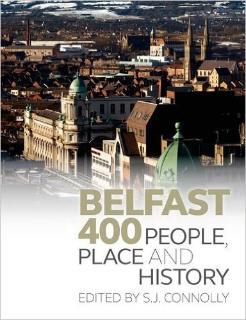'Imagining Belfast': Civic culture and identity
Professor Sean Connolly and Dr Dominic Bryan, History, Queen’s University Belfast
Professor Connolly and Dr Bryan’s research explored how Belfast’s citizens have negotiated and articulated their political, religious, and cultural identities since the eighteenth century. It has helped both Belfast City Council and the devolved Northern Ireland government to develop a strategy for managing the politically contentious issue of anniversaries, and to promote a shared sense of heritage in a divided city.
The research
Combining historical and anthropological research, Professor Connolly and Dr Bryan surveyed historical and contemporary identity practices (such as participating in parades and displaying flags) in Belfast over the past two centuries, and considered the impact of public policy towards the regulation of public space. Their focus was on the long-term development of civic identity and its representation in ceremonial and commemoration, as well as on patterns of belonging and exclusion determined by religion, class, gender and ethnicity. The result of this research was the collaborative publication Belfast 400.

The central thrust of Professor Connolly and Dr Bryan’s research was to move away from a narrow focus on the long term origins of Belfast’s political and religious divisions, conceived of as a zero sum conflict between clearly defined and irreconcilably opposed identities. Instead, they argued, identity in Belfast is complex and multidimensional, based on shifting combinations of ethnicity, religion, civic localism and class, and current disputes over identity practices need to be understood in the context of modern urban development, and the changing nature of public space and how it is used and policed. It was important that Belfast 400 should not be a sanitised history: a substantial chapter examines patterns of exclusion and inequality in terms of class, religion, gender and ethnicity. At the same time the overall narrative, emphasising the complex and fluid nature of identity, explicitly challenges aspects of both nationalist and unionist master narratives of the city’s history, offering instead an alternative, more inclusive vision of its past.
Policy impact and engagement
Professor Connolly and Dr Bryan’s research has formed the basis for a series of interventions that have had a direct impact on the formulation of policy at municipal and government level.
Belfast City Council, the Community Relations Council and the “Imagining Belfast” project team arranged a one day seminar (29 January 2008), Developing Shared Spaces in Belfast, intended to involve all the major policy stakeholders in the area. The seminar was attended by senior civil servants, council and agency chief executives and senior police officers, as well as local NGOs and property developers. Following on from this seminar, Dr Bryan worked with Belfast City Council, on an ‘agenda for action’ deriving from the seminar proceedings and from a series of reports undertaken for the council by consultants.
Dr Bryan has been a member of the Community Relations Council Roundtable Marking Anniversaries panel, where he has advised on how the decade of anniversaries might be approached, while since 2007 Professor Connolly and Dr Bryan have been members of a working party established by the Heritage section of Belfast City Council to consider policy in this area.
Their research has been completed at the commencement of a decade that will be dominated by the issue of howcommemoration. A succession of forthcoming anniversaries – the campaign against Home Rule, the 1916 rising, the Irish War of Independence, the establishment of Northern Ireland as a devolved political unit, the creation of an independent Irish state – present major challenges in a society deeply divided along religious and political lines. Belfast City Council has adopted Belfast 400 as a major part of its plans for the commemoration of the charter anniversary, thus putting the research at the centre of the development of a strategy for dealing with these issues of commemoration and reconciliation.



